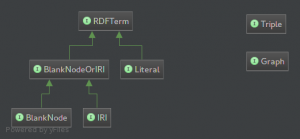In the Java world there has been historically an incompatibility issue between the two major RDF toolkits: Apache Jena and OpenRDF Sesame.
Commons RDF represents an interoperability approach that does not attempt to be a generic API wrapping for those libraries, but provide a set of interfaces for the RDF 1.1 concepts that can be used to expose cores concepts using common Java interfaces.
In the initial phase Commons RDF is focused on a subset of the core concepts defined by RDF 1.1 (URI/IRI, Blank Node, Literal, Triple, and Graph). In particular, Commons RDF aims to provide a type-safe, non-general API that covers RDF 1.1. In a future other aspects around RDF (datasets, query, etc.) may be also included.
The library comes from the need for providing a generic and neutral API for RDF 1.1 that everybody can transparently use without bounding the design to concrete implementations. This is very important for the MICO platform, since the architecture outlined in D6.1.1 requires now the provision of different APIs. Although the underline implementation is based on SPARQL and LDP, the MICO project also has the need of providing native seamless interfaces to those APIs, both in Java and C++, for the people in the consortium who are less experienced with those technologies. Therefore such interfaces should not enforce on any partner or industry client the usage of a specific RDF toolkit regardless of the concrete implementation details.
The library is the result of cooperation between contributors to the main Java toolkits, and will be available in a timely manner to influence the major version updates Jena 3.0 and Sesame 4.0. But it will live or die on its own merits!
The working repository can be found at GitHub,. Although sooner than later we plan to move somewhere else, Apache Commons or any organization suitable for goals and needs of the project. For the moment we are still defining what are the project’s targets and goals. In the upcoming months we will be presenting the work at ISWC2014 and at ApacheCon Europe; so we look forward to meet and discuss the project with the community.
